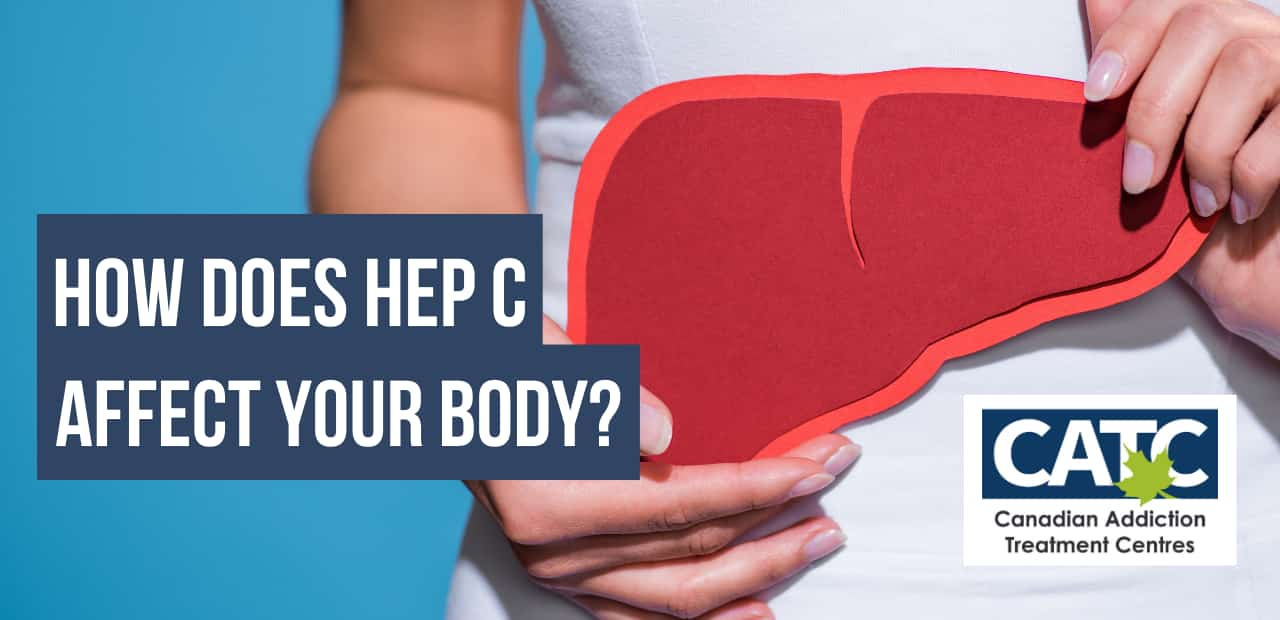How Does Hepatitis C Affect Your Body?
How Does Hepatitis C Affect Your Body?
Have you or someone you know been diagnosed with Hepatitis C (HCV)?
HCV infections are primarily spread through contact with infected blood, but can also be transmitted sexually, from mother to child during pregnancy, or even while getting a body piercing.
Hep C attacks the liver most severely, but can also have an impact on other organs such as the digestive system, nervous system, immune system, endocrine system, and more. Symptoms of infection may include fatigue, abdominal pain, and jaundice – yellowing of the skin or eyes due to elevated levels of bilirubin in the bloodstream – as well as nausea and vomiting.
While it’s clear that this dangerous virus can have serious consequences if left untreated, can you die from Hep C? To find out the answer to this common question, along with everything else you need to know about HCV infections, read on.
Can You Die From Hep C?
While it’s possible for people to clear this acute viral hepatitis spontaneously and without treatment, many individuals will require antiviral therapy to eradicate it completely. One of the most common questions our patients have is “does Hep C cause long-term damage?” The simple answer is that while some people may get lucky, others may not be as fortunate — it may greatly depend on the individual’s immune system and overall health.
However, no matter what your state of health is, if you believe you have contracted Hepatitis C, you should seek out screening and medical attention immediately so you can begin antiviral therapy if diagnosed with the virus. Seeking treatment right away can help eradicate this infection completely while reducing the risk of any long-term damage to your health. Those who begin treatment can go on to live completely normal lives, free of the dangerous Hep C side effects.
If left untreated, however, the infection can become chronic and stay in the individual’s bloodstream for life. It’s possible for individuals with Hepatitis C to develop lasting health issues, organ failure, and cancer in some cases; therefore prompt diagnosis is important for proper treatment options before complications arise.
There is often a lot of confusion surrounding this infection, which is why so many people wonder if you can die from HCV infections. In short: Yes, you can die from Hepatitis C if left untreated over long periods of time, so it’s best not to take chances when it comes to your health.
Hepatitis C and the Liver
We know that viral Hepatitis is a serious condition that primarily targets the liver, but what effect does Hepatitis C have on the liver? If left untreated, unfortunately, HCV infections can lead to liver damage (cirrhosis), liver cancer, or other liver diseases. Since the virus attacks the liver, symptoms of Hepatitis C infection may include fatigue, abdominal pain, jaundice (yellowing of the skin or eyes), nausea, and vomiting.
The liver plays an important role in many bodily functions including digestion, metabolism, detoxification, and immunity. When someone contracts Hepatitis C, the virus causes inflammation and liver damage, particularly to the hepatocytes – cells inside the liver. This can lead to developing cirrhosis or scarring on this organ over time. This condition affects its ability to function properly and increases the risk for other complications such as portal hypertension and potentially liver cancer if left unchecked for long enough periods of time. Ultimately, the individual may need liver transplantation if the disease continues to progress.
Fortunately, there are treatments available that have been proven effective at helping individuals clear this virus completely without any long-term side effects. However, these must be administered promptly after diagnosis in order to achieve maximum efficacy. In addition, lifestyle changes such as abstaining from alcohol intake while undergoing treatment can help speed up recovery times significantly by providing additional support for your body’s immune system against this infection.
If you think you may have contracted Hepatitis C, it’s best not to take any chances when it comes to your health – seek out medical attention immediately so that appropriate antiviral therapy can begin before any further harm is done.
Digestive System
How does Hep C affect the body when it comes to the digestive system? The digestive system is composed of organs that work together to break down food into smaller molecules that can then be absorbed by the body. It also aids in the elimination of waste material from the body. The gut, on the other hand, is a complex system of bacteria located in the intestines that play an important role in digestion, metabolism, and immunity.
Hepatitis C can affect both organs systemically, causing a variety of symptoms such as nausea, vomiting, abdominal pain, and fatigue. It is also known to cause damage to the intestines, leading to an increased permeability to toxins and bacteria – known as leaky gut syndrome – which can cause further inflammation and debilitation of the digestive tract.
What you can do to ease symptoms of Hepatitis C in your digestive system would be to make lifestyle changes. Ensure that you’re eating a balanced diet with plenty of fiber and whole grains for each meal. Make an effort to avoid processed and refined sugars and take probiotics regularly. These steps can help to reduce inflammation in the gut, promote digestive regularity, and allow your body to absorb essential nutrients more efficiently.
If you’re still having difficulties despite making these lifestyle changes, then be sure to speak to your doctor about medications such as anti-inflammatories or corticosteroids, which may also help ease any discomfort you might be experiencing.
Central Nervous System
The central nervous system (CNS) is a complex network of nerves and cells that controls all body functions. It includes the brain, spinal cord, and other sensory organs such as eyes, ears, and skin. The CNS receives information from the environment through its receptors before translating this into electrical signals which are then sent to different parts of the body to control our movements, senses, and even our emotions.
Unfortunately, Hepatitis C can have devastating effects on the body’s central nervous system (CNS) in several ways. The virus can cause inflammation of the brain and spinal cord, resulting in symptoms such as confusion, depression, and decreased cognitive function. It can also impact the peripheral nervous system, resulting in tingling, pain, and numbness of the extremities. In severe cases, Hepatitis C can lead to encephalitis, a potentially fatal inflammation of the brain.
The best way to ease symptoms of Hepatitis related to the CNS is with early diagnosis and treatment. Anti-viral medications are designed to reduce the amount of virus in the body and prevent further damage from occurring to the liver and nervous system.
In addition, lifestyle modifications may also be beneficial for alleviating symptoms by improving overall health and well-being. These include exercising regularly, eating a balanced diet, avoiding alcohol consumption, and managing stress levels. Phototherapy has also proven to be beneficial for some patients with Hepatitis C-related CNS issues, as it is known to reduce inflammation and improve mood.
Finally, it’s important to note that this virus can take a toll on both your physical and mental well-being, so be sure to seek out support if you’re struggling with issues such as anxiety or depression. Therapy can help tremendously in terms of managing symptoms and improving quality of life.
Hair, Skin and Nails (Integumentary System)
A lesser-known side effect of Hepatitis C is that it can affect the integumentary system, which includes the skin, nails, and hair. The skin may become dry, itchy, and discoloured, while the nails become brittle and discoloured. Not only that but hair loss can also occur in some cases. All of these effects can lead to a decrease in self-esteem for those affected, as well as making them more susceptible to infections in these areas.
To prevent these symptoms from manifesting, see your doctor to begin taking anti-viral medications as soon as possible. In addition, lifestyle modifications may also be beneficial for alleviating symptoms in relation to the integumentary system. Always strive to eat a balanced diet that is rich in essential vitamins and minerals and use moisturizers or special soaps that are specifically made for those with sensitive skin.
It’s important to note that this virus can take a toll on emotional and mental well-being due to the physical changes it causes, so it’s important to engage in activities that can help to combat the emotional toll it can take as well. For instance, speaking to a trusted friend or loved one, as well as a mental health professional or joining a support group can help reduce anxiety and depression related to Hepatitis C.
Immune System
In some cases, acute hepatitis can cause an individual to develop chronic viral hepatitis, which can have a major impact on the immune system. It can cause chronic inflammation and weaken the body’s ability to fight off infections. It can also increase one’s risk of developing autoimmune diseases, in which the body attacks itself, such as lupus, rheumatoid arthritis, and type 1 diabetes. Generally speaking, although most autoimmune diseases can be controlled, they normally can’t be cured.
If you’re struggling with hepatitis C symptoms related to the immune system, you should aim to exercise regularly, eat a balanced diet, get adequate rest, and most importantly, listen to your body if you notice particular symptoms showing up. If you’re feeling stressed out or burnt out due to work or personal matters, this can cause a flare-up of symptoms because your immune system is compromised. Never feel guilty about taking a break or turning down professional or personal engagements if you’re not feeling up to it, as your health is what matters most.
To boost your overall health and well-being, supplements such as vitamin C and vitamin D3 may help support and strengthen the immune system. Probiotics are another great option for aiding digestion and allowing for proper nutrient absorption. Finally, a daily greens supplement is another essential for ensuring you’re getting an adequate amount of vitamins and antioxidants each day in addition to a healthy diet.
Endocrine System
The endocrine system is a complex network of glands that play an important role in regulating various body functions through the release of hormones into our bloodstream. These hormones act as chemical messengers sent out to different organs and tissues, which then help control things such as growth, metabolism, reproduction, and even our mood! The most commonly known endocrine glands include:
- The pituitary gland, located at the base of the brain (which produces growth hormone)
- Thyroid gland, which is situated near the throat region (which helps regulate metabolism)
- Pancreas, which is found behind the stomach area (responsible for secreting insulin amongst other key hormones)
- Also, the hypothalamus, adrenal glands, and gonads (ovaries/testes)
HCV infections can have a major impact on the entire endocrine system and hormones overall. It can cause inflammation of the thyroid, pancreas, and other glands, which can lead to an imbalance in the hormones produced by these organs. If you have a hormonal imbalance, you may experience a variety of symptoms such as fatigue, weight gain, and mood swings.
Once you seek treatment, antiviral medications will help to restore proper hormone production and level out any imbalances caused by Hepatitis C. Additionally, making sure you’re getting enough fatty acids in your diet is essential. Be sure to supplement with daily omega-3 fatty acids to support proper hormone production.
Lastly, engaging in relaxation techniques such as yoga or meditation may also help with managing stress levels, which can help improve your hormonal regulation. Combining better habits each day with getting a proper night’s rest is key to better overall endocrine health.
Fortunately, making these lifestyle changes can greatly lessen the uncomfortable and dangerous symptoms of viral Hepatitis. You should, however, always consult your doctor first prior to undertaking any new approaches – especially those regarding medication – just in case there is an underlying condition involved here too.
Contact CATC for Hepatitis C Tests and Treatment Options
If you think you may have been exposed to Hepatitis C, it is important that you get tested as soon as possible. HCV infection can cause serious and long-term health problems if left untreated, so the sooner a diagnosis is made the better. Our team at Canadian Addiction Treatment Centres (CATC) offers comprehensive testing and treatment options for those who believe they may have been infected with this virus. Our same-day screening allows you to get your results right away — with nothing more than a finger poke!
Learn More About Hepatitis C Testing
If you test positive for the virus, our team can refer you to a highly skilled physician who specializes in the latest treatments available for Hepatitis C. We are dedicated to providing personalized care that meets your individual needs, ensuring that all aspects of your health are taken into consideration when developing a plan of action tailored specifically for you. Our staff also provides education about prevention methods and risk factors associated with Hepatitis C transmission so that patients can make informed decisions regarding their own healthcare choices.
With early detection being key in preventing further damage from occurring, contact CATC today for us to reach out or to learn more about our services related to hepatitis C screening and treatment plans. We’re here 24/7 ready to help answer any questions or concerns you may have to help you get back on track to better overall well-being.



